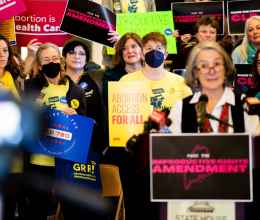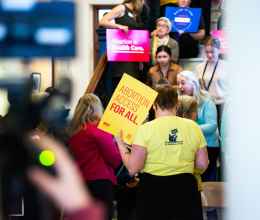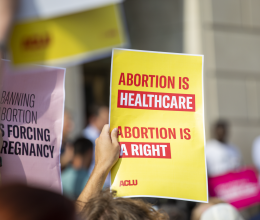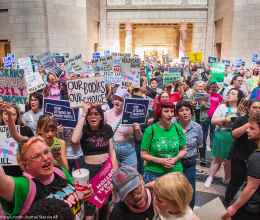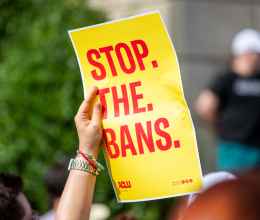March is Women’s History Month! We're celebrating some of our favorite champions, from Maine and away.
Today, we’d like to highlight the work of Dorothy Height. Height was born on this day in 1912, in Richmond, Virginia.
Height's contribution to racial and gender equality is immeasurable. She spent almost 50 years of her life fighting tirelessly for civil rights. She was one of many early feminist leaders who failed to receive the same public recognition as their male counterparts during the Civil Rights Movement. Height's involvement and participation in the 1963 March on Washington made her one of the most visible black women during this monumental event. Height, one of the organizers of the march, was the only woman asked to share the stage with Dr. Martin Luther King, Jr. and the other male civil rights activists. She was asked to be present on the stage as a representative of the National Council of Negro Women (NCNW), but, despite her role in organizing the march and despite her exemplary oratory skills, she was not asked to speak that day.
early feminist leaders who failed to receive the same public recognition as their male counterparts during the Civil Rights Movement. Height's involvement and participation in the 1963 March on Washington made her one of the most visible black women during this monumental event. Height, one of the organizers of the march, was the only woman asked to share the stage with Dr. Martin Luther King, Jr. and the other male civil rights activists. She was asked to be present on the stage as a representative of the National Council of Negro Women (NCNW), but, despite her role in organizing the march and despite her exemplary oratory skills, she was not asked to speak that day.
The roots of Dorothy Height's activism stretch far back before the 1963 March on Washington. In 1937, while working as a social worker for the Harlem YWCA, Height met educator and founder of NCNW, Mary McLeod Bethune while she was visiting the facility with first lady Eleanor Roosevelt. Height, who had recently received her master’s degree in psychology from NYU, was eager to become more active in the struggle for civil rights. She soon volunteered with the NCNW and became McLeod Bethune’s mentee. Height was eventually elected fourth national president of the NCNW in 1957. She served as president for 40 years (until 1998). During her leadership, NCNW became the first black women’s organization to publicly speak out in support of Roe v. Wade. Height was in staunchly in favor of abortion rights because she knew the majority of women being affected by the aftermath of illegal abortions were poor women of color. She believed that women’s rights and abortion rights were tied to civil rights. In addition to leading the NCNW, Height remained on the staff of the National board of the YWCA for 33 years (1944-1977).
Height continued to be active in reproductive rights struggles throughout her life. When the National Organization for Women sponsored the first March for Women's Lives (1986), Height made sure that NCNW was one of the first groups to endorse the march. Three years later, when Donna Brazile (then executive director of the National Political Congress of Black Women) and Byllye Avery asked black women's organizations to issue a joint statement supporting abortion rights, Height was one of the first leaders to step forward. The historic statement, "We Remember: African American Women for Reproductive Freedom" became a crucial and inspirational document for activists invested in reproductive justice for women of color.
When she passed on April 20, 2010, President Obama called Dorothy Height “the godmother of the civil rights movement and a hero to so many Americans.” He continued by acknowledging that in her struggle to achieve civil rights for women and black people, she witnessed “every march and milestone along the way.” After Height died, Loretta Ross (co-founder of the reproductive justice organization, Sister Song) wrote that Height's "impact on the struggle for human rights [left] footprints so large they may never be filled." You can read Ross's memorializing article here. You can read more about Dorothy Height and her legacy on the NCNW's website.

